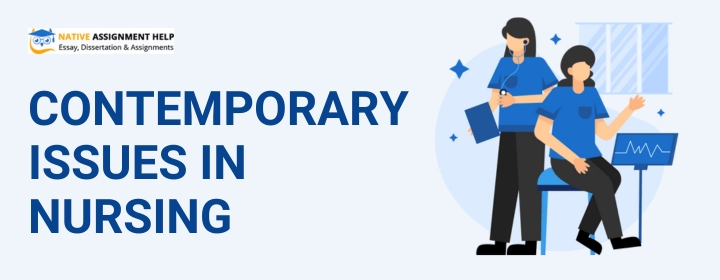
- Key Challenges Faced By Mordern Nursing Workforce
- Tackling Nursing Workforce Shortages and Challenges
- Addressing Mental Health Challenges in Nursing
- Technological Advancements and Innovations in Nursing Practices
- Ethical and Legal Considerations
- Promoting Diversity and Inclusion in Nursing
- Future Trends and Predictions in Nursing
- Empower Your Nursing Career with Expert Insights and Support!
Some prominent issues in modern nursing consist of workforce shortage, long working hours, evolving patient needs, staff safety, burnout, and efficient training of technological advancements. Nowadays, patient care duties are growing beyond the traditional leadership, advocacy and practices. This development is caused by numerous factors such as the involvement of advancements in medical technology, different patient demographics, and increasing healthcare system complexities. Correspondingly, nurses should stay instructed about emerging trends, challenges, and opportunities that form their profession.
This contemporary issue in nursing blog focuses on offering invaluable insights into the growing role of nursing, outlining the importance of adapting to upcoming issues that affect practice. Topics covered include the integration of technology in patient care, the importance of mental health awareness, and the necessity of cultural competence. Through these, we aim to equip aspiring nurses, healthcare professionals, and students with the knowledge and tools needed to navigate modern healthcare challenges.
Key Challenges Faced By Mordern Nursing Workforce
Nursing is a broad field that might pose various challenges. Let’s take a peek at some of the current major nursing workforce challenges in nursing.
Tackling Nursing Workforce Shortages and Challenges
The worldwide shortage in nursing is a crucial issue that harshly affects healthcare delivery. Contributing aspects involve a senior workforce, increased rates of burnout and inadequate internship opportunities.
According to WHO, there is an additional 13 million nurses required by 2030, heightened by growing healthcare demands and insufficient hiring efforts. This lack of nurses leads to increased wait times, lower patient care quality and increased workload on previous staff.
Some solutions include improving hiring strategies, enhancing working conditions, and offering continuous professional growth to maintain nurses. Moreover, encouraging global hiring can also help fill gaps while confirming that local internship programs are sufficiently funded to support future workforce requirements.
Addressing Mental Health Challenges in Nursing
Nurse burnout and mental stress are growing worries which significantly impact job satisfaction and patient care. Highly stressed environments and excessive work pressure contribute to emotional fatigue and disillusionment among healthcare staff. Evidence-based strategies to enhance mental health support integrate the implementation of peer guidance programs and offering access to mental health resources.
Personal stories from nurses explain the immediate need for frequent alterations to manage these mental health challenges in nursing. Prioritising mental health and well-being helps foster a more resilient nursing workforce and improvement in patient care.
Technological Advancements and Innovations in Nursing Practices
Let’s check out some of the best innovations and advancements that emerged in the healthcare and nursing systems.
Technological Integration in Contemporary Nursing Practice
The involvement of technology in nursing techniques, such as AI, telehealth and electronic health records (EHRs), is changing the healthcare landscape. These advancements improve patient care by enhancing accessibility, minimising errors, and facilitating communication.
For example, telehealth enables nurses to monitor patients remotely and offer care to patients in rural areas. While EHRs help in quick access to patient information, enhancing decision-making. To adapt to these advancements, nurses should engage in continuous training, embracing new tools and advocating technology that completes their caregiving duties. This ensures that technology improves or replaces the human touch in nursing.
Evidence-Based Practice and Continuing Education
Evidence-based practice is essential in nursing to ensure that patient care is dropped in the best possible research. Continuous learning is important for nurses to stay updated on the latest methods and evidence.
Resources for constant education involve online courses, workshops and professional meetings that boost skill development and enhance learning. Integrating EBP not only enhances patient outcomes but also improves career upgrade opportunities for nurses. By promising lifelong education, nurses can efficiently involve new learning in practice, leading to improved care quality and patient satisfaction.
Ethical and Legal Considerations
Here are some crucial ethical and legal nursing issues that nurses should address well during their careers.
Ensuring Patient Privacy in Nursing Practices
Nurses possess a basic legal obligation to maintain privacy and confidentiality of patient details i.e., it is essential to build a strong and loyal nurse-patient relationship. In the modern era, the upgrade of electronic health records (EHRs) and telehealth has led to new legal consequences regarding the safety of patient details.
For example, information breaches can occur via unofficial access to EHRs or irrelevant information sharing through digital platforms. Case studies like happenings where nurses accidentally reveal patient details in public and outline the importance of care in maintaining confidentiality.
Advocacy and Patient Rights
Nurses perform a crucial duty as supporters of patient privileges, directing intricate legal dilemmas like informed consent, end-of-life care, and health equity. Current issues, integrating differences in healthcare credentials, need nurses to advocate the rights of helpless populations.
For instance, confirming that patients comprehend their cure options and the applications of their options is necessary for informed approval. Assistance for directing these legal challenges integrates immersing in open communications with patients and collaboration with interdisciplinary groups. Also, using legal frameworks to assist decision-making.
Promoting Diversity and Inclusion in Nursing
Nurses are crucial in managing health disparities and encouraging fair healthcare for various populations. Let’s understand in brief.
Addressing Health Disparities
Nurses play a crucial role in minimising health differences among various populations by supporting fair access to healthcare services. Some victorious initiatives involve community health programs that aim at marginalised communities and have shown the efficiency of culturally skilled care in enhancing health results.
For example, mobile clinics that offer preventive care and learning in local areas have greatly increased healthcare access. Moreover, maximising the racial and ethnic variety of the nursing workforce can fill cultural gaps and improve patient faith. By boosting relations with communities and comprehending their distinct needs, nurses can execute tailored interventions which handle particular health disparities.
Promoting Cultural Competence in Nursing
Cultural competence is necessary for giving quality patient care, as it allows nurses to comprehend and respect various cultural beliefs and practices. Strategies for evolving cultural competence involve participation in internship programmes, engaging with various communities and seeking peer guidance.
In real-world instances such as a nurse rightly directing the language obstacle with a non-English-Speaking patient via the use of translation devices. By improving their cultural familiarity and skills, nurses can enhance patient relations, boost trust and contribute to more useful health results for patients, regardless of their environments.
Future Trends and Predictions in Nursing
Let us understand some major future trends and predictions taking place in nursing. This will help you understand the future of nursing and the healthcare landscape.
The Evolving Role of Nurses
With the continuous evolution of the healthcare landscape, the role of nurses is anticipated to develop and acclimate to meet the altering demands of patients and communities. Nurses will play an extremely important role in managing worldwide health trends. These trends are increasing the prevalence of chronic illnesses, ageing people, and climate change affecting health.
Emerging areas of advancement include people's health, telehealth, and informatics. Nurses will be at the front to design and execute strategies for encouraging health equity, managing social determinants of health and enhancing access to care for poop populations.
Preparing for the Future
To stay forefront in their careers, nurses should assume adaptability and constant learning. Daily updating of knowledge and skills via persisting education, skilled development, and participation in nursing institutes is necessary to adapt to the rapidly changing healthcare systems.
Nurses must be fierce in pursuing opportunities for leadership, research and innovation, which can be a key to shaping their future careers. Adopting change is necessary for nurses as they direct new advancements, care delivery standards and patient population.
Conclusion
To sum up, this investigation of contemporary issues in nursing outlines the developing role of nurses, and recent challenges like workforce shortage, mental health worries, etc. Managing these health disparities and encouraging cultural competence is necessary for offering genuine care. Ethical and legal considerations remain crucial in nursing practices. As we glance at the future, the nursing profession should adapt according to emerging trends and equip for upcoming opportunities. Being informed about these issues is essential for nurses, healthcare professionals and learners alike. This ensures that they are trained to direct the difficulties of modern healthcare and keep on providing high-quality patient care.
Empower Your Nursing Career with Expert Insights and Support!
Learn more about overcoming nursing challenges by exploring our comprehensive guides. According to the article mentioned above, the upcoming nurses face different challenges and issues in nursing. These challenges will also break down your learning confidence.
That's why Native Assignment Help is here to support you. Our dedicated experts are working 24*7 on the platform to address your queries and questions. We have qualified PhD and Master’s writers who provide you with comprehensive, high-quality, well-researched and 100% AI-free, handwritten academic papers. We offer tailored and customised support with your requirements and match them accurately according to your academic guidelines.
We also offer the benefit of on-time work deliveries so that you can avoid worries of procrastination. The best part of our assignment help service is our affordability, which ensures that the services are accessible to all students.
Also, take advantage of our pleasing benefits which are flat 35% off on the first order with an additional 10% off on WhatsApp orders. Enjoy additional gifts like free sample papers, quality check reports, Turnitin reports, editing, formatting, etc for absolutely free. You can also choose a preferred nursing assignment help expert of your choice to receive the best assistance.
Ready to overcome your nursing challenges? Connect with our experts today for tailored guidance.
Hey learners! Searching for some contemporary nursing issues? Then keenly go through my blog. I am Ivy, a PhD student of Nursing. In the past 8 years, I have helped thousands of students on Native Assignment Help with their nursing projects. In this blog, you will learn about the current challenges, innovation and advancements, ethical and legal concerns, diversity and inclusion, and future trends and predictions in nursing. If you want to explore more on these issues or need any kind of support you are free to connect with me anytime during the day and get expert support.



